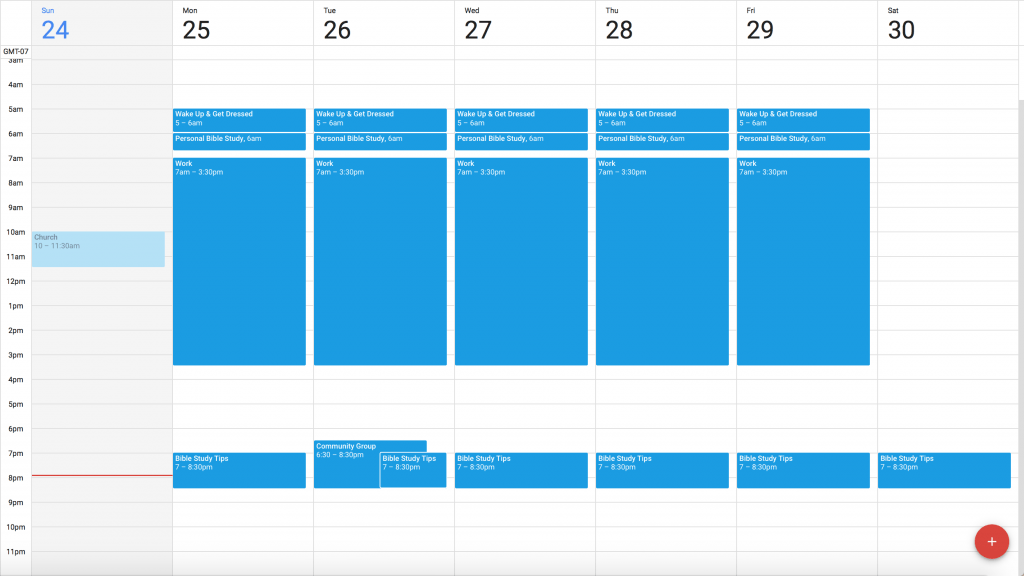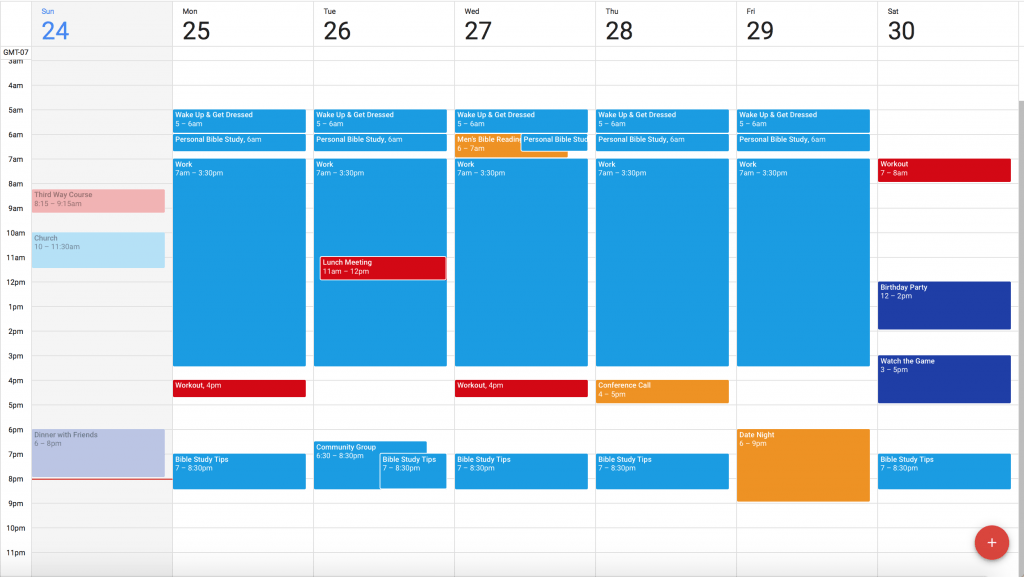Time is one of our most precious assets. Everyone is given the same 24 hours to complete all the things they need to do. For most people, that means spending 8 hours working, another handful sleeping, spending time with family & friends, and whatever else they can squeeze into the remaining time. This is why proper time management is a must for Christians. Without it we’ll always be out of whack and struggle to get things done.
That’s why we’re focusing on the principle and discipline of time management in this week’s tip. By the time you’re done with this tip, you will have a better handle on how to allocate your time and be better equipped to live a balanced life.
Do You Have Self Discipline?
To start, think about how you spend a typical day. How does it look? Do you feel like you can get everything done? Or is it chaos and you scramble to fit everything in? How much of your time do your family and loved ones get? Do you have time for Bible study and prayer?
If you’re like most people, you either spend the majority of your day at work or school. The remaining time is spent squeezing in the rigors of life, leaving little time for the Lord.
I’ve been there; I understand. I struggled with a lack of self discipline for years and only now feel like I have a firm grasp on it. And let’s be honest, there are still days and weeks when life falls apart and I’m back at square one.
Notice I said I struggled with a lack of self discipline. Time management is just that. It is a discipline we learn through consistent practice and training. If we aren’t disciplined with the use of our time we will always squander it. After years of mismanaged time you’re left asking, “Where did the time go?!”
So, what are some things you can do to get a grasp on time management and make it a discipline? Over the course of this tip we will: 1) examine how you currently spend your time, 2) rearrange your schedule, and 3) explain its importance to your spiritual growth.
Steps to Time Management
Step 1: Map Out Your Time
The first step to recover lost time is figuring out how it’s currently being used. So, pull out a sheet of paper, a planner, or calendar and list everything you do in a single week. As best you can, account for every hour in the day, even your sleep. A digital calendar is great for this, because you can easily duplicate & move items. Below is an example of how I spend a typical week.

As you can see, my day starts around 5 AM. The first hour of my morning is spent getting ready for the workday, which is primarily showering & getting dressed. By 6 I’m sitting at my dining room table ready to spend time with the Lord in Bible study and prayer. I’m out the door by 7 and working until about 3 or 3:30 PM. The block of time left open after work is generally dedicated to family, or whatever else I need to get done. This includes time with the kids, having dinner, and putting the kids to bed. A few days a week I’ll even squeeze in a workout. Some days are busier than others; therefore I deal with that time as needed.
From 7 to 8:30 PM I write and work on projects related to Bible Study Tips. Depending on the day, I may get an earlier start or work later, especially if my wife is busy with something. The rest of the evening is for my wife and however she would like to spend it with me. Finally, I’m in the bed by 10 or 10:30 PM.
When it comes to the weekend, I usually leave it wide open. I want to enjoy my time away from work and decompress as much as possible. This also includes any family activities that are happening. Of course Sundays are busy with church activities, but I also try to make that day as restful as possible.
What’s on my calendar are the non-negotiables of life. Everything else squeezes into the remaining free time.
Putting your time on paper is the first step to time management. So, take some time and map out your typical week. Be as detailed as possible. Being thorough now will help you account for every hour in an upcoming step. Once that’s done, you’re ready for step 2.
Step 2: Analyze and Adjust
Now that you have it on paper, take a glance at your typical week. How does it look? Is it organized or chaotic?
If your week is fairly organized and routine, you won’t have much work to do. But, if your schedule is crazy, expect to spend some time making sense of it all. Here are some steps you can use to get your schedule organized:
- Find your week’s non-negotiable items (i.e. work/school, church, family activities)
- Create a new (blank) calendar. Add these events and mark them with a color representing their status as important
- With a skeleton calendar in place, look at the remaining events from your old calendar. Determine which events are important and which ones aren’t. Color code these according to their level of importance
With your color coded calendar in place, now you can see at a glance which items are most important to you.
As an example, take a look at my calendar below.

Step 3: Give God His Time
In this unrelenting and non-stop world, it’s important to make time for God. It’d be great if we could spend all day in prayer, worship, and Bible study; but, that’s not possible until heaven. So, in the meantime we’re forced to find time in our busy schedules to commune with God. And now that we have a view of our calendar, it’s time to see where God fits on our calendar.
First, you need to figure out what type of person you are. When do you work best? Are you an early bird, a night owl, or something in-between?
With this information in hand, go back to your calendar and see what occupies that time. Is that time flexible at all? Can you rearrange your schedule to give yourself time with the Lord when you know you’re at your best? If not, can you find something close to that time?
I’m a morning person, which means I am usually mentally spent come evening. Knowing this, I do my Bible study in the morning before work. This allows me to give the Lord my best time, when I’m mentally alert and fresh. Now, I wish I could do my Bible Study Tips work at the same time, since it’s also spiritually related, but my schedule doesn’t allow it. Thus, I compromise and do that work in the evening. I know I’m not at my best, but it’s better than the alternative of waking up at 3:30 or 4 AM and going to bed earlier.
Even if you have to split your time, do what works best for you. Maybe the best you can do is 3 mornings and the rest of the week has to be in the evening. If so, make it work. The goal is consistency and instilling self discipline. When you fit Bible study into your schedule and keep it over an extended period of time, you will create that discipline and it will become habit, no matter the schedule.
Now, let me saying this: we’re talking about formal times of Bible study. Our days and weeks should also contain multiple opportunities for occasional meditation as we go about the day. Sitting at a table with Bible open should not be the only time we think about God’s Word.
Step 4: Make Time to Rest
With the most important parts of our calendar out of the way, now we rest. No, we’re doing done with tweaking the calendar. I’m talking about making time to rest. The Lord gave the Sabbath for a reason. He wanted us to rest and reflect upon him. Now, I’m not going to tell you how to spend your Sabbath. That is between you and the Lord. But I strongly suggest giving yourself a break from the rigors of a busy routine. Burn out is real, and you should have safeguards in place to prevent it.
Don’t be a workaholic. Workaholics burn out and burn bridges in the process. Don’t be the person who thinks everything has to be done in the moment and never stops. Those who fail to rest and refuel eventually run out of gas, become discontent and depressed, or, worse, quit. The sad truth is it all could have been avoided if they’d only given themselves room to breathe. Find comfort in the fact that there are only 24 hours in a day. With most jobs, any unfinished work will still be there tomorrow.
Sundays are my day of rest. Outside of church, I do not commit to much else. Even the work of Bible Study Tips gets put on hold for the day. I still spend time with the Lord, but it isn’t nearly as in-depth as during the week. I’ll either read a Bible passage, a devotional, or reflect on my sermon notes.
Rest is of the Lord, so don’t neglect it. Rest is vital to good time management.
Burn out is real. Put safeguards in place to prevent it. Share on XStep 5: Transition Time
When putting events on your calendar, don’t forget to allow for transition time. Transition time is the time between events for rest and regrouping. Our brains need time to shift from one focus to another; and transition time provides that space.
Depending on the task, your transition time will vary. There will be times when you can jump from one task to another without a break. At other times you might need an extended break. Remember, we are humans, not machines. We can only process so much information at any given time. So, we must rest and refocus when necessary.
One great way to optimize your transition time is by cashing in on your commute, whether you drive or ride a bus or train. On the way to work, we can use it as a time to meditate or chill. And on the return trip, it’s the perfect opportunity to decompress and shift gears mentally before engaging in the rest of the evening.
Do be wary, though, that you do not take more time than needed. Too much “transition time” can quickly lead to procrastination and laziness, which is not what we want.
Rest is of the Lord, so don’t neglect it. Rest is vital to good time management. Share on XMaximize Your Study Time
Let’s now turn our attention briefly to our study time. Below are a few principles to keep in mind whenever you come to a time of study.
1. Open with Prayer
Next to a scheduled time for study, prayer is the most important thing you can do to maximize the time. Nothing hinders Bible study more than entering into it with unconfessed sin and not seeking his guidance and wisdom. This doesn’t need to be an extended time of prayer, but you should ask the Lord to be with you as you study.
Prayer is the first step to fruitful Bible study.
2. Read & Take Notes
We talked about taking notes and journaling in previous Bible study tips. Keeping a record of what you’ve learned is one of the best ways to maximize your study time. This gives you the opportunity to pick up where you left off, if you do not finish a study in a single session. Likewise, it serves as a catalog you can return to at a future date for growth and encouragement.
3. Don’t Rush
Many people fail in their Bible study because they rush the process. The goal is not checking off boxes or saying “done!” or that you did your duty. No, time with the Lord should be precious and savored. Any good relationship is built on quality time, and our time with God is no different.
You only hinder your own growth by rushing through your time with God. It’s not about getting a set amount of verses studied. So, it doesn’t matter if you run out of time before you finish a study. That’s what your notes are for. Simply pick up where you left off without missing a beat.
Not to mention, when you rush, it’s easy to misinterpret the text and miss the meaning altogether.
Prayer is the first step to fruitful Bible study. Share on XBible Study Time Management Pitfalls
For as much as both Bible study and time management are good things, there are still pitfalls we should be aware of. When it comes to these items, their pitfalls are born out of an unbalanced life. Unbalanced living can lead to two extremes: lack of study or too much study.
Below are the consequences of these two extremes you should guard against in your life.
Pitfalls of Not Enough Study
We’ve already covered some of the pitfalls that result from a lack of study, but here are a few more.
- Spiritual Malnutrition. When you neglect Bible study, it shows in your life. If you don’t eat, you become weak. The same is true in the spiritual realm. Your spiritual growth suffers and you become susceptible to the next pitfall.
- Sin. When you are spiritually weak, you are more prone to sin. The Holy Spirit’s power in your life is no longer as strong and you are feeding your flesh’s desires. The Psalmist tells us we are to hide the Word in our heart so we might not sin against the Lord (Psalm 119:11). Therefore, a life without prayer & Bible study leaves the door wide open for sin and temptation to take its place.
- Doctrinal Error. The student who does not diligently study is prone to error. Continued error leads to false teachings, and down the line. When you rush or don’t study enough, you are not giving yourself the time to properly understand God’s Word. Taken to the extreme, such errors can be damning.
Pitfalls of Too Much Study
Just as there are pitfalls for not spending enough time in study, snares await those who spend too much time studying. These pitfalls are just as dangerous, so guard against these as well.
- Neglecting Responsibilities. Once you have a habit of Bible study it’s easy to get lost in your work and lose track of time. What feels like a few moments will be hours in reality. Do not forget that you have responsibilities that must not be neglected, especially if you have a family. Bible study should improve your life, not hinder it.
- Pride. The Bible says “knowledge puffs up” (1 Corinthians 8:1), and it too can be a snare born from overextended study. It’s easy to think you know more than the Christian sitting next to you when you’ve spent more time in your Bible. But remember the reason why you study: to know God and serve him better. Serving God includes loving his people, and that requires humility. When you keep this in mind, you will keep pride at bay.
Conclusion
Time management will make or break you. A well managed life that makes time for the Lord will be one that finds peace in the midst of life’s chaos. Without it, you are at life’s whim and wherever it takes you. God wants us to be good stewards of our time so we can focus on the things that matter.
Bible study and spiritual growth should be in your list of things that matter. So, take time management seriously and honor God with your life. Spend time this week getting your time organized and make time management a priority.
Weekly Study Prompts
This week, meditate and journal on the following passages:
- Monday – Daniel 5-6
- Tuesday – Daniel 9-10; 12
- Wednesday – Ezra 1-2
- Thursday – Ezra 3-4
- Friday – Ezra 5-6
- Memory Verses: Daniel 6:26-27; 9:19
Free Bible Study eBook
Enter your name & email below to get a free copy of our "Bible Study Blitz" ebook that will give you 5 tips to enhance your Bible study.





